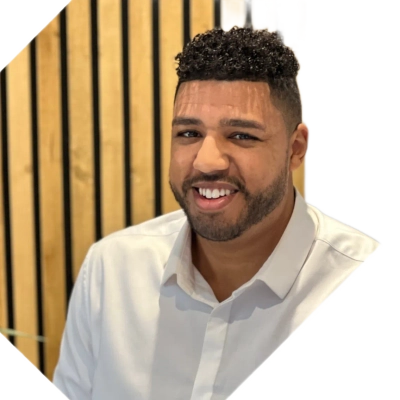How Pushing Through Difficult Skills Can Transform Them Into Passions
Turning challenges into opportunities often requires persistence and a shift in perspective. This article explores how professionals across various fields transformed difficult skills into passionate pursuits. Drawing on insights from experts, it reveals the transformative power of pushing through obstacles in diverse areas such as coding, jazz improvisation, and therapeutic practices.
- Coding Frustration Transforms into Career Catalyst
- Jazz Improvisation Evolves from Struggle to Passion
- Vulnerability Becomes Key to Therapeutic Breakthroughs
- Emotional Regulation Emerges as Cornerstone Skill
- Donor Relationships Shift from Transactional to Personal
- Data Analysis Transforms from Anxiety to Strategic Tool
- Social Media Strategy Evolves Through Storytelling Approach
- Design Decisions Connect with Business Outcomes
- Leadership Growth Fuels Senior Homecare Success
- Analytics Mastery Enhances SEO and Content Strategy
Coding Frustration Transforms into Career Catalyst
Coding initially made me want to throw my computer out the window. Error messages confused me, syntax felt like a foreign language, and I questioned my intelligence daily.
I committed to one hour of practice every morning before work. I built tiny, broken projects, asked endless questions in forums, and celebrated small victories like successfully printing “Hello World.”
The transformation occurred when I solved my first complex problem independently. The rush of making something work after hours of debugging was addictive. Suddenly, I craved challenges instead of avoiding them.
Now I lead a development team and mentor junior developers. The persistence that once felt torturous became my career catalyst, teaching me that mastery requires embracing discomfort as growth.
 Ankush Chowdhury
Ankush Chowdhury
Founder, Humanizer AI
Jazz Improvisation Evolves from Struggle to Passion
The skill I initially struggled with but later became my passion was jazz improvisation. At the beginning, I could only play pre-written pieces. When I attempted to improvise, I would last only a few notes before either running out of ideas or getting stuck. I recall several instances where I timed myself and found that I could only get through less than 20 seconds of improvisation before falling silent, which was frustrating.
I didn’t give up and decided I needed to establish a rigorous routine on my instrument to improve. I played for two hours a day, breaking my solos into short phrases of four or five notes and repeating each phrase at least 20 times. After a few weeks, I began to increase the length of my solos to one minute, and then after six months, I could improvise freely for three to four minutes non-stop. The process wasn’t easy, but it completely transformed my approach to the piano. Improvisation replaced the most frustrating aspect of my practice with the most fulfilling part of my career.
 Steve Nixon
Steve Nixon
Founder, Free Jazz Lessons
Vulnerability Becomes Key to Therapeutic Breakthroughs
The most challenging skill for me as a new Licensed Marriage and Family Therapist (LMFT) was vulnerability in therapy sessions. Initially, I believed that being the “expert” meant having all the answers and maintaining professional distance. While I could get through sessions technically, clients weren’t experiencing significant breakthroughs.
Everything changed when I began acknowledging my own uncertainties and sharing appropriate aspects of my personal healing journey. One teenage client, who had been emotionally closed off for weeks, suddenly opened up when I admitted that I didn’t have all the answers but was committed to figuring things out together. That session became a turning point in her trauma recovery.
Now, vulnerability is absolutely central to how I practice Eye Movement Desensitization and Reprocessing (EMDR) and trauma work at Full Vida Therapy. My most powerful sessions occur when I can create an authentic space where clients feel safe to be completely honest. What I initially perceived as a weakness has become the foundation for genuine therapeutic connection.
The shift happened when I realized that therapy isn’t about being an all-knowing professional—it’s about being human enough that someone trusts you with their pain.
 Viviana McGovern
Viviana McGovern
Owner & Founder, Full Vida Therapy
Emotional Regulation Emerges as Cornerstone Skill
Emotional regulation and distress tolerance were completely foreign concepts to me when I first started training in psychology. I intellectually understood therapeutic frameworks but struggled to genuinely sit with intense emotions – both my own and clients’ – without wanting to “fix” everything immediately.
The breakthrough came during my work with complex trauma and personality disorders. I forced myself to learn Dialectical Behavior Therapy (DBT) techniques, initially just to help clients manage self-harm and emotional volatility. The irony was that practicing these distress tolerance skills myself – radical acceptance, mindful breathing, sitting with uncertainty – transformed how I approached every session.
Now emotional regulation has become the cornerstone of everything I do at MVS Psychology Group. When working with burnout cases or relationship conflicts, my ability to remain genuinely present with difficult emotions allows clients to feel truly heard rather than rushed toward solutions. What used to feel overwhelming now feels like the most meaningful part of therapeutic work.
The shift happened because I realized that my discomfort with intense emotions was actually limiting my clients’ progress. They could sense when I was trying to move away from their pain too quickly, which broke the therapeutic trust that’s essential for real change.
 Maxim Von Sabler
Maxim Von Sabler
Director & Clinical Psychologist, MVS Psychology Group
Donor Relationships Shift from Transactional to Personal
Donor relationship building was absolutely brutal for me when I started Rocket Alumni Solutions. Coming from investment banking where everything was transactional, I kept treating donors like deal targets instead of people with stories and motivations.
The turning point came when I scrapped our data-heavy pitch decks and started conducting in-person interviews with donors at our partner schools. One major donor told me he gave because his late father was a teacher, not because of our ROI metrics. That conversation completely shifted how we approached recognition – we started featuring donor testimonials and personal stories in our interactive displays.
Our donor retention rate jumped dramatically once we made this switch, and repeat donations rose over 25%. What I thought was just fundraising became my obsession with community building. Now I spend months understanding each donor’s personal connection to education before we even discuss giving levels.
The skill I dreaded most – authentic relationship building – became the foundation that got us to $3M+ ARR. Those early awkward conversations taught me that recognition isn’t about displaying names on plaques; it’s about helping people see their impact and feel genuinely valued.
 Chase McKee RAS
Chase McKee RAS
Founder & CEO, Rocket Alumni Solutions
Data Analysis Transforms from Anxiety to Strategic Tool
Data analysis and metrics interpretation initially felt overwhelming and intimidating but eventually became one of my most passionate professional interests – transforming from a source of anxiety into a powerful tool for strategic decision-making that I genuinely enjoy using daily.
The Initial Struggle:
Early in my marketing career, I avoided deep data analysis because spreadsheets and analytics platforms seemed impenetrable. I focused on creative aspects like content creation and campaign design while delegating number-heavy work to colleagues, limiting my strategic contributions and growth opportunities.
The Turning Point:
A project required me to identify why our content marketing wasn’t generating expected results. Instead of relying on surface-level metrics, I forced myself to dig deeper into user behavior data, conversion funnels, and engagement patterns.
The Breakthrough Moment:
When I discovered that our highest-converting content pieces shared specific characteristics invisible in basic analytics, I experienced genuine excitement about data’s storytelling potential. The numbers revealed user preferences and behavior patterns that completely changed our content strategy and dramatically improved results.
How Persistence Transformed My Relationship:
Pushing through initial discomfort taught me that data analysis is creative problem-solving disguised as number crunching. Each dataset became a puzzle revealing insights about customer behavior, market trends, and strategic opportunities that weren’t obvious from surface observations.
The Passion Development:
Now I actively seek opportunities to analyze performance data, user behavior patterns, and market trends. What once felt like a tedious obligation has become intellectually stimulating detective work that informs strategic decisions and generates competitive advantages.
Professional Impact:
This analytical capability transformed my career trajectory from tactical execution to strategic planning. Understanding data enables confident recommendations backed by evidence rather than intuition, creating credibility with stakeholders and improving business outcomes measurably.
Key Learning:
Skills that initially challenge us often become our strongest assets because the struggle develops deeper understanding and appreciation than naturally easy abilities. Persistence through difficulty creates expertise that feels earned and genuinely valuable.
 Raj Baruah
Raj Baruah
Co Founder, VoiceAIWrapper
Social Media Strategy Evolves Through Storytelling Approach
Social media strategy was my worst nightmare when I first started at Davincified. I came from a product design world where things were nice, clean interfaces and user flows – but social media is messy and unpredictable.
I remember spending hours writing what I considered absolutely solid posts, only to have them not be acknowledged at all. At the same time, a random video showing a person painting a custom superhero would go viral with comments and shares. It was really frustrating because I could not figure things out as I had always been able to do.
The breakthrough was realizing that the key to social media wasn’t to think of it as a design problem, but to think of it as a story problem. Rather than posting images that were all nicely constructed and put together, I started posting moments captured in real-time from our customers – the joy when someone opened their custom kit, the look on their face when they were painting, even the “oops” moments that had all of us laughing.
Now, what was once a nightmare has turned out to be my favorite part of the job. When people are already putting themselves out there in our space – as they have to do when they turn their photos into art – I’ve learned that being real takes priority over being perfect all the time. That whole mess taught me how to be okay with mistakes and connect with people in real life.
Now, social platforms are contributing nearly 40% of all our new customers. The one area that I struggled with the most was the way we actually speak to our people.
 Jacob Elban
Jacob Elban
Creative Strategist, Davincified
Design Decisions Connect with Business Outcomes
For me, it was connecting design decisions to business outcomes. Early on, I focused heavily on perfecting the user interface and crafting seamless interactions, but I often struggled to demonstrate how those design choices impacted the bigger picture. Instead of sticking to just the design layer, I began immersing myself in product discovery and data analysis. I started working closely with cross-functional teams, asking more questions, and grounding design decisions in measurable goals. Over time, I realized that great UX isn’t just about usability; it’s about driving meaningful results. What once felt like a gap in my skill set has now become the foundation of how I lead design at Qminder – bridging user needs with strategic value.
 Heidi Taperson-Lelumees
Heidi Taperson-Lelumees
Head of Design, Qminder
Leadership Growth Fuels Senior Homecare Success
When I first became the owner of a senior homecare company, the most significant challenge wasn’t the day-to-day operations; it was leading people. I didn’t exactly struggle with leadership, but I quickly realized it was a skill that required constant practice, patience, and growth. Early on, I had to learn how to balance being decisive while also listening deeply to my team and the families we serve.
What started as an area I needed to work on became one of my greatest passions. Over time, I found immense fulfillment in helping my team members grow, supporting them through challenges, and watching their success translate into better care for our clients. Leadership stopped feeling like a responsibility and became a source of energy for me.
Today, guiding people and building a culture of compassion is at the core of what I do. In senior homecare, where trust and empathy mean everything, strong leadership doesn’t just transform a company – it transforms lives. For me, the journey of becoming a better leader has been one of the most rewarding parts of business ownership.
 Christian Bullas
Christian Bullas
Owner/Director, Senior Homecare By Angels
Analytics Mastery Enhances SEO and Content Strategy
One of the competencies where I did not perform well at the beginning was analytics and data interpretation. In the beginning, I had challenges trying to interpret all these figures and their direct implications on my strategies. However, as I spent more time understanding and implementing the data, I came to understand its power in decision-making and streamlining of strategy.
What was once a challenge turned out to be something that I now enjoy. Data has changed everything about the way I think about SEO and content strategy; it is not enough to see results but to know why they occurred. Conquering that challenge has helped me feel more confident about making decisions and more enthusiastic about the possibilities of using data to inform significant development. The lesson is that often the abilities we find the hardest are the ones that pay off the most when we force ourselves to overcome them.
 Michael Alexander
Michael Alexander
Managing Director, Tangible Digital






